EUROPE
Annual meeting of the European network on cross-border observation
February 2025Find out about the observation resource sites that were presented!
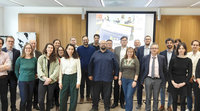
Find out about the observation resource sites that were presented!
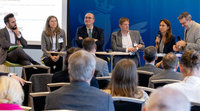
On November 4th, 2024, a conference entitled ‘Planning the cross-border functional area’ was held in Luxembourg, organised jointly by AGAPE, MOT, and the Grand Duchy's Ministry of Housing and Spatial Planning, with more than 80 participants in attendance.

The University of the Greater Region (UniGR) and the University of Luxembourg organised the closing event of the Erasmus+ "EurIdentity Certificate" project and the annual conference on higher education and research in the Greater Region on 27 June 2023 on the Belval campus in Esch-sur-Alzette.
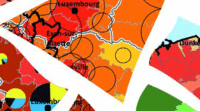
On April 13th, 2023, the second meeting of the MOT-ANCT working group dedicated to observation, co-hosted by the Atlantic and Pyrenees Urban Planning Agency (AUDAP) and the French Riviera Agglomeration Community (CARF), took place.
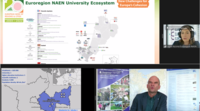
Review of the MOT workshop at the #EURegionsWeek.
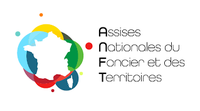
On October 6th and 7th, the Assises Nationales du Foncier et des Territoires were held in Nancy. Aimed at discussing land issues in all their aspects, from upstream to downstream and from strategy to implementation, they brought together nearly 600 people, elected representatives and professionals, from both public and private sectors, for conferences, workshops and round tables, in 11 thematic sessions.
The Grand Est Region, which currently holds the presidency of the Greater Region, and the Greater Region Economic and Social Committee, in partnership with the Greater Region Interreg V project “COSAN”, organised a seminar on approaches to foster resilience in the Greater Region’s healthcare systems on 28 April 2022 in Metz.
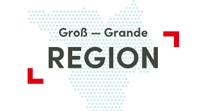
The Greater Region’s Cooperation Fund has been extended by the Greater Region Summit with a new call for projects. Its aim: "To bring the inhabitants of the Greater Region closer together and to enable them to experience the richness of exchanges across borders".

In January 2022, the Summit of Greater Region Executives took stock at the midpoint in France’s presidency, particularly with respect to the industrial, digital and energy transitions, flood and drought risk prevention, food and promoting short supply chains, culture, youth, sport and tourism, healthcare and security.
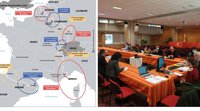
This autumn, and for the second consecutive year, the MOT organised nine “territorial meetings”, so as to keep in close contact with the members of its network, and involve them in preparing its annual programme. Held successively in Besançon, Strasbourg, Lille, Annemasse, Charleville-Mézières, Nice, Urrugne, Perpignan and Metz, both virtually and in person, the meetings brought together close to 200 participants in total.

On 18 November, the PAMINA Eurodistrict, in partnership with the MOT, held a seminar on the circular economy in the cross-border setting.
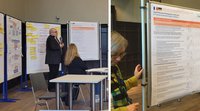
Concrete expressions of the Aachen Treaty, two MORO* pilot projects on the Franco-German border aim to strengthen the cross-border dimension of territorial development practices, using an innovative method that has been widely tried out in Germany – the "Planspiel"**:
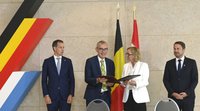
On 31 August 2021, the Belgian and Luxembourg Ministers of Health signed a declaration of intent with a view to negotiating a framework agreement on cross-border healthcare cooperation between the two countries.
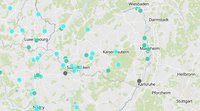
The Greater Region’s Geographical Information System and ATMO Grand Est have joined forces in order to develop an interactive map that makes it possible to check air quality across the whole of the cross-border territory of the Greater Region.
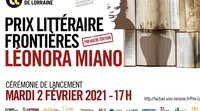
On 2 February, the University of Lorraine and the University of the Greater Region, in collaboration with the UniGR-Center for Border Studies, launched the first edition of the “Borders” literary prize, dedicated to the universe of the writer Léonora Miano.

A declaration of intention on the future of institutional cooperation in the fields of higher education and research in the Greater Region was signed on 25 November 2020 in Saarbrücken, at a ministerial conference held under Saarland’s presidency. At the conference, the ministers and representatives from the five partner regions took stock and discussed the consequences of the health crisis for cross-border cooperation between higher education and research institutions.

At its plenary assembly in October, the Grand Est CESER adopted an opinion on cross-border civil society. The MOT had been formally heard as part of the preparation of this publication.
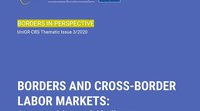
Edited by Isabelle Pigeron-Piroth (University of Luxembourg) and Rachid Belkacem (University of Lorraine), the latest thematic issue published by the UniGR-Center for Border Studies provides an analysis of cross-border employment and related issues. Comprising seven chapters contributed by ten authors, it has a preface by Jean Peyrony, the MOT’s Director-General.
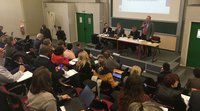
The MOT and Euro-Institut are carrying out a capitalisation study on behalf of the Grand Est region, funded by the Europ’Act technical assistance programme. Within this framework, three seminars have been held: in Strasbourg on 4 December, in Metz on 3 February, and in Charleville-Mézières on 10 February.

On 21 November 2019 the UniGR – Center for Border Studies held in Esch-sur-Alzette, in Luxembourg, its fourth Greater Region Forum, on the topic "Revitalisation of inner cities in the Greater Region". In the light of the pressure on the retail sector in the Greater Region, as well as in other cross-border regions, the discussions focused on the organisation of retailers in the face of this competition, on consumer behaviour and on possible avenues for co-development.
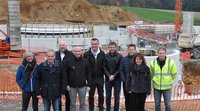
On 30 October 2019, the construction site of a new cross-border waste water treatment plant was presented to the public – a large-scale project on the border between Belgium and Luxembourg.
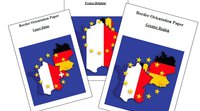
In the context of the preparation of its 2021-2027 programmes, DG REGIO has drawn up 38 Border Orientation Papers (BOPs) for all of the EU’s land borders. Six of these BOPs relate to France’s borders.
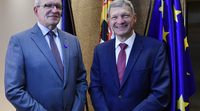
On 9 May 2019, Europe Day, the Moselle Department asked for an expansion of its competences on account of its specific location within the territory of the Greater Region, in order to foster closer links, greater effectiveness and simplified partnerships with its European neighbours.
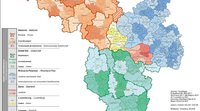
Within the framework of the Interreg “Greater Region Territorial Development Plan” project, the Greater Region Executives Summit have laid the political groundwork for the drawing-up of a common cross-border territorial strategy for the Greater Region partners.
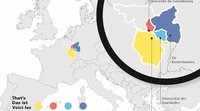
The Master in Border Studies is a two-year joint international study program, which addresses the complex economic, political, social and cultural issues of borders and of border regions in Europe and beyond. The Master provides students with the major concepts and analytical tools to understand the various challenges of border regions and cross-border cooperations.